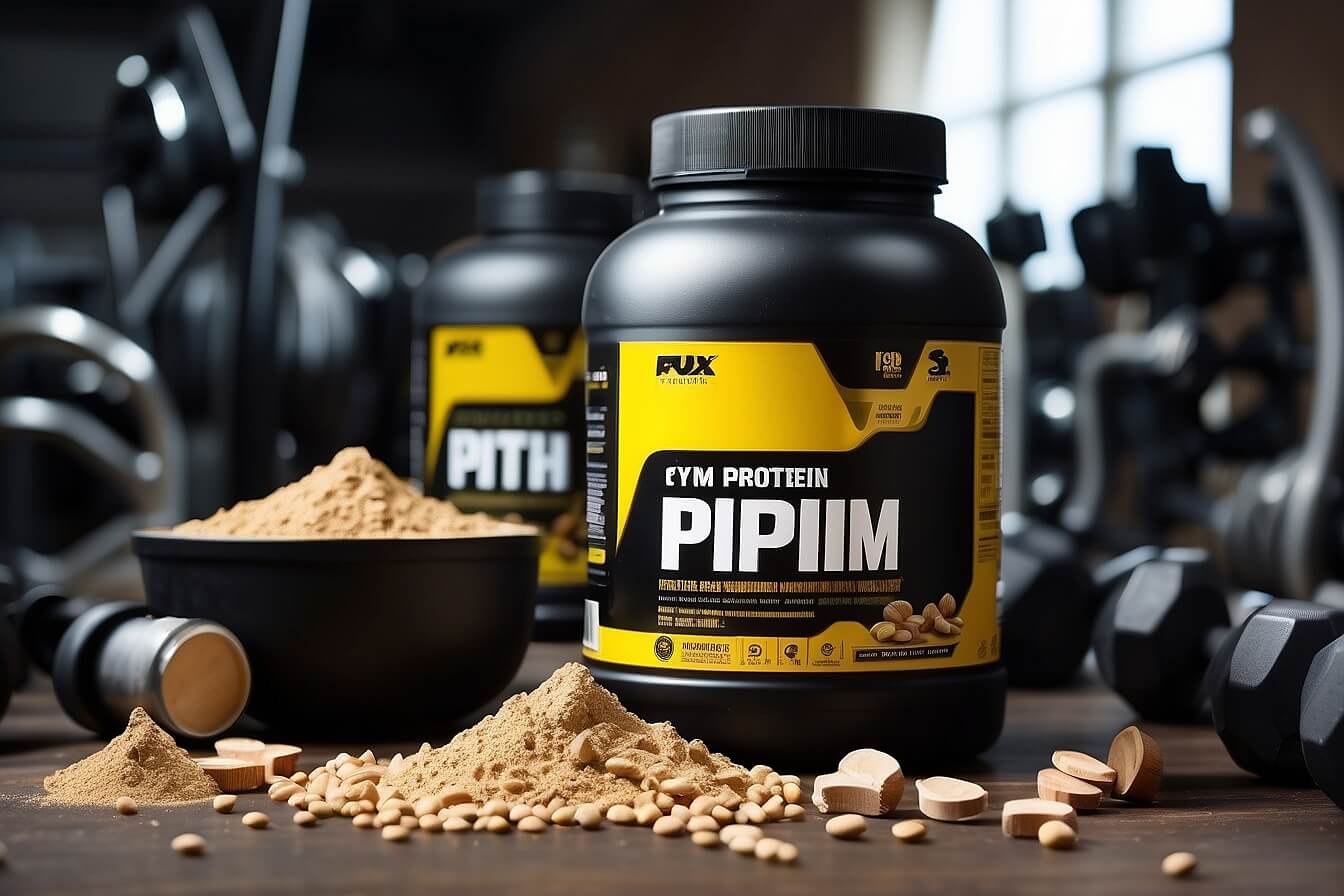Table of Contents
Unmasking the Truth: Are Your Fitness Supplements Harming More Than Helping?
In the dynamic realm of fitness, supplements have become omnipresent, claiming to hold the key to unlocking health and aesthetic goals. However, beneath the alluring packaging and persuasive marketing, lies a complex landscape fraught with potential pitfalls. Let's unveil the reality surrounding fitness supplements and scrutinize whether they might be causing more harm than good.
Introduction
The fitness supplement industry is flourishing, inundating shelves with powders, pills, and potions promising to elevate performance, foster muscle growth, and expedite fat loss. Yet, as these products soar in popularity, concerns about their safety and actual efficacy escalate.
Decoding Fitness Supplement Labels
Before delving into potential hazards, it's imperative to comprehend the information displayed on those eye-catching supplement containers. Many consumers fall prey to cunning marketing tactics, often overlooking critical details. Let's unravel the secrets concealed within supplement labels, exposing common deceptive terms and strategies.
Decoding fitness supplement labels is a crucial skill for consumers to make informed choices. When deciphering these labels, pay attention to the 'Supplement Facts' panel, as mandated by the FDA. Here's a concise guide:
- Nutrition Label: Located on the back of the product, it lists the names and amounts of each ingredient. Understanding this panel is essential for assessing the supplement's composition and potential effectiveness.
- Supplement Facts: This standardized label includes information on dietary ingredients. Unraveling this section provides insights into the nutritional content and potential health benefits of the supplement.
- Fine Print: Don't overlook details. Some consumers fall prey to misleading terms and tactics. Carefully scrutinize the entire label, looking for hidden proprietary blends or synthetic additives that may pose risks.
- Transparency: Opt for brands committed to transparency, third-party testing, and quality sourcing. Customer reviews can offer valuable insights into a brand's credibility.
Navigating the Murkiness of Proprietary Blends
Navigating the murkiness of proprietary blends in dietary supplements requires a keen understanding of their implications and potential risks. Proprietary blends are formulations that combine multiple ingredients, and their exact composition is undisclosed. This lack of transparency raises concerns about the accuracy of dosages and the safety of consumers.
Consumers must be aware that proprietary blends can make it challenging to assess the effectiveness and safety of a supplement. Research suggests that proprietary blends can be difficult to evaluate due to their complex matrices[4]. Furthermore, the use of proprietary blends in dietary supplements has spurred discussions within the scientific community, with a focus on their impact on research and the need for clearer regulations[1][3].
In navigating this complex landscape, consumers should prioritize understanding the rationale behind the use of proprietary blends and stay informed about ongoing discussions within the industry and academia. The murkiness surrounding proprietary blends emphasizes the importance of advocating for clearer labeling standards and increased transparency in the supplement industry. As consumers, being well-informed empowers us to make conscious choices about the supplements we choose to incorporate into our health and wellness routines.
Unveiling Hidden Dangers in Synthetic Ingredients
Unveiling the hidden dangers in synthetic ingredients is a crucial exploration, shedding light on potential risks associated with everyday products. Synthetic fragrances, commonly found in air fresheners and personal care items, can contain harmful chemicals linked to respiratory issues and reproductive problems.
Additionally, the dangers extend to protein powders, as highlighted by researchers who screened numerous products. Some protein powders may harbor contaminants that pose health risks, including potential links to cancer and other conditions.
Artificial food additives also fall under scrutiny, with concerns about their impact on health. These additives may contribute to adverse effects, prompting a deeper examination of their role in our daily diet.
Moreover, synthetic ingredients in skincare products are not exempt from hidden dangers. The cosmetic industry's use of synthetic compounds raises questions about potential long-term effects on skin health and overall well-being.
In essence, understanding the hidden dangers of synthetic ingredients emphasizes the importance of informed consumer choices, advocating for clearer labeling standards, and encouraging a shift towards more natural and transparent alternatives.
Balancing Act: The Pitfalls of Overreliance on Protein Supplements
While protein supplements have become a cornerstone in many fitness enthusiasts' diets, the protein craze may have its downsides. We'll discuss the potential pitfalls of overreliance on protein supplements and stress the importance of a balanced approach to nutrition.
Overreliance on protein supplements, while popular in fitness culture, poses potential pitfalls that warrant careful consideration. While these supplements are marketed for muscle growth and performance enhancement, a review of existing studies highlights both benefits and disadvantages. Excessive reliance on protein supplements can lead to an imbalance in overall nutrition, neglecting the importance of a diverse and whole-food-based diet. Protein supplements are a valuable addition for specific needs but should not replace natural sources of protein. The risk of overconsumption, coupled with potential contaminants in some products, underscores the importance of moderation and informed choices. A balanced approach, incorporating a variety of protein sources from whole foods, is crucial to avoid the drawbacks associated with overreliance on supplements.
Artificial Sweeteners: Examining Their Impact on Health
Artificial sweeteners have become widely popular as sugar substitutes, especially among individuals aiming to reduce calorie intake or manage conditions like diabetes. Examining their impact on health reveals a nuanced landscape with ongoing research and debates.
Research suggests that artificial sweeteners while offering a low-calorie alternative to sugar, may have effects on long-term health. Some studies associate them with potential risks such as alterations in gut microbiota composition, which could influence weight control and metabolic processes. Additionally, concerns have been raised about the impact on cardiovascular health, with a higher risk of certain conditions associated with their consumption.
However, it's crucial to note that artificial sweeteners also present benefits. They can aid in weight management, blood sugar control, and dental health by reducing sugar intake.
As the debate continues, individuals need to make informed choices based on their health needs and preferences. Moderation remains key, and consulting with healthcare professionals can provide personalized insights into the use of artificial sweeteners as part of a balanced diet.
In conclusion, while artificial sweeteners offer a viable alternative to sugar, their impact on health requires careful consideration. Striking a balance and staying informed about the latest research findings can empower individuals to make choices aligned with their overall well-being.
The Role of Regulatory Bodies: Navigating the Oversight Landscape
Regulatory bodies are entrusted with ensuring the safety and efficacy of supplements. However, the oversight isn't foolproof. We'll examine the current state of regulatory measures in the industry and the challenges they face in keeping up with the ever-evolving supplement landscape. Navigating the oversight landscape of dietary supplements involves a keen understanding of the role played by regulatory bodies. Regulatory bodies, such as the FDA, play a pivotal role in ensuring the safety, quality, and efficacy of dietary supplements. This oversight is crucial for both consumers and businesses operating in the supplement industry. By adhering to regulatory standards, brands can build trust and credibility. Businesses should stay informed about regulatory changes, comply with labeling requirements, and engage in transparent practices to foster a positive relationship with regulatory bodies, contributing to the integrity of the dietary supplement market.
Choosing Quality Over Quantity: Recognizing Reputable Brands
Not all supplements are created equal. We'll emphasize the importance of quality sourcing and manufacturing, guiding readers on how to identify reputable supplement brands committed to transparency and safety.
In the realm of dietary supplements, the mantra "quality over quantity" is paramount for consumers seeking optimal health benefits. Recognizing reputable brands is crucial in ensuring that the supplements chosen are safe, effective, and trustworthy. Here are key factors to consider:
- Third-Party Certification: Reputable brands often undergo third-party testing for quality assurance. Certifications from organizations like Informed Choice and USP signify adherence to rigorous standards.
- Transparent Labeling: Reputable brands provide clear and transparent labeling, detailing ingredients, dosages, and potential allergens.
- Positive Reviews and Ratings: Customer reviews and high ratings can offer insights into the effectiveness and trustworthiness of a brand.
- Top-Selling Products: While not the sole criterion, top-selling supplements, as indicated by platforms like Bodybuilding.com, can hint at a brand's popularity and trustworthiness.
- Professional Endorsements: Recognition from fitness professionals and experts can be a positive indicator of a supplement's efficacy and safety.
By prioritizing these factors, consumers can navigate the saturated supplement market, ensuring they choose quality over quantity for their well-being.
Embracing Natural Alternatives and Whole Foods
In the contemporary pursuit of a healthier lifestyle, the emphasis on natural alternatives and whole foods has gained significant momentum. A plethora of benefits underscores this shift in dietary choices.
1. Enhanced Nutrient Profile: Natural alternatives and whole foods offer a rich and diverse array of essential nutrients, including vitamins, minerals, and antioxidants. These nutrients, in their unprocessed and unrefined state, contribute to overall well-being and support various bodily functions.
2. Sustainable Energy: Unlike processed and refined foods, natural alternatives and whole foods provide sustained energy levels. The complex carbohydrates, fiber, and natural sugars found in these foods contribute to stable blood sugar levels, promoting sustained energy throughout the day.
3. Digestive Health: The fiber content in whole foods supports digestive health by regulating bowel movements and fostering a healthy gut microbiome. This, in turn, contributes to improved nutrient absorption and overall digestive well-being.
4. Disease Prevention: Whole foods, particularly plant-based options, are associated with a reduced risk of chronic diseases such as heart disease, diabetes, and certain cancers. The abundance of phytonutrients and antioxidants in these foods contributes to their protective effects.
5. Weight Management: Incorporating natural alternatives and whole foods into one's diet is often linked to effective weight management. The nutrient density and fiber content promote satiety, reducing the likelihood of overeating and supporting weight loss or maintenance.
6. Environmental Impact: Choosing natural alternatives and whole foods aligns with environmentally conscious practices. These foods often have a lower environmental footprint compared to heavily processed options, contributing to sustainability.
In the race towards embracing natural alternatives and whole foods, individuals are not only enhancing their health but also making a positive impact on the planet. The holistic benefits extend beyond individual well-being to encompass broader ecological and societal considerations.
The Right Mix: Customizing Your Supplement Plan
Achieving an optimal state often involves more than just a one-size-fits-all approach. "The Right Mix" encapsulates the essence of customizing a supplement plan tailored to individual needs. Here's an in-depth look at the key aspects of crafting a personalized supplement regimen:
1. Personalized Assessment: The journey begins with a comprehensive assessment of individual health factors. This includes considerations such as age, gender, lifestyle, dietary habits, existing health conditions, and specific health goals. A personalized approach recognizes that each person's nutritional requirements are unique.
2. Targeted Nutrient Deficiencies: Customization involves identifying specific nutrient deficiencies or imbalances through thorough analysis. Whether it's a lack of essential vitamins, minerals, or other bioactive compounds, tailoring the supplement plan addresses these gaps to support overall well-being.
3. Health Goals Alignment: Crafting the right mix entails aligning the supplement plan with individual health objectives. Whether the focus is on energy enhancement, immune support, stress management, or fitness goals, personalized supplements cater to these specific needs, optimizing the likelihood of desired outcomes.
4. Avoiding Unnecessary Ingredients: Customization ensures that individuals receive the nutrients they need without unnecessary additives or excess dosages. This approach minimizes the risk of overconsumption and addresses potential adverse reactions, promoting safety and efficacy.
5. Evolving Plans with Changing Needs: The beauty of customization lies in its adaptability. As health needs evolve with age, lifestyle modifications, or shifts in objectives, a personalized supplement plan can be adjusted accordingly. This dynamic approach ensures ongoing relevance and effectiveness.
6. Professional Guidance: Collaborating with healthcare professionals or certified nutritionists is integral to the customization process. Their expertise helps interpret assessment results, navigate potential interactions, and provide evidence-based recommendations, contributing to the overall success of the personalized supplement plan.
In essence, "The Right Mix" underscores the transformative power of tailoring supplement plans to individual nuances, fostering a holistic approach to health that goes beyond generic recommendations.
Dispelling Myths: Science-backed Truths About Fitness Supplements
Dispelling myths is essential to foster a clearer understanding of their impact. Here are science-backed truths to debunk common misconceptions surrounding fitness supplements:
**1. Natural Supplements are Ineffective: Contrary to the belief that natural supplements lack efficacy, scientific research consistently demonstrates the benefits of various natural ingredients. For example, herbal extracts, amino acids, and botanicals often contribute to improved performance and recovery.
**2. All Supplements are Unsafe and Unregulated: While regulatory standards vary, reputable supplement brands adhere to stringent quality controls. Many supplements undergo third-party testing to ensure purity and potency. This commitment to safety counters the misconception that all supplements are unregulated and potentially harmful.
**3. Supplements Are Only for Deficiencies: Fitness supplements extend beyond addressing nutritional deficiencies. They serve as valuable tools to enhance athletic performance, support muscle growth, and optimize recovery. Athletes often use supplements strategically to meet specific training goals.
**4. Supplements Must be Avoided for Injury Recovery: In contrast to the belief that supplements hinder injury recovery, certain nutrients play a crucial role in the healing process. For instance, collagen supplements support joint and tissue repair, aiding in a faster and more robust recovery.
**5. Whey Protein Harmful Myths: Whey protein is a widely misunderstood supplement. Contrary to misconceptions, it is a natural, safe, and highly digestible protein source. Research supports its efficacy in promoting muscle synthesis and aiding in weight management.
By dispelling these myths, individuals can make informed decisions about incorporating science-backed fitness supplements into their routines. Understanding the evidence-based truths behind these myths empowers individuals to harness the benefits of supplements safely and effectively.
Listening to Your Body: A Mindful Approach to Supplementation
Understanding the nuances of our body's responses to supplements is integral to optimizing health and well-being. Adopting a mindful approach to supplementation involves:
1. Individual Variability: Recognizing that each person's body is unique and may respond differently to various supplements. Genetic factors, lifestyle, and overall health contribute to these individual differences.
2. Paying Attention to Reactions: Mindful supplementation entails attentiveness to how our bodies react to different supplements. This involves being aware of changes in energy levels, mood, digestion, or any potential adverse effects. Such awareness allows for timely adjustments.
3. Adjusting Dosage and Types: A crucial aspect of mindfulness in supplementation is flexibility. Instead of rigid adherence to standardized doses, individuals should be open to adjusting both dosage and types of supplements based on their evolving needs and responses.
4. Mindful Observance: Fostering a mindful approach goes beyond the physical aspects. It involves paying attention to mental and emotional responses as well. Factors such as stress levels, sleep quality, and overall mood contribute to the holistic understanding of how supplements impact well-being.
5. Consulting Professionals: While listening to one's body is essential, seeking guidance from healthcare professionals adds another layer of mindfulness. Consulting with a healthcare provider or nutritionist can provide personalized insights and ensure that supplement choices align with individual health goals.
By emphasizing this mindful approach, individuals can navigate the diverse landscape of supplementation with a heightened sense of self-awareness. This approach promotes optimal health outcomes by tailoring supplement regimens to the unique needs of each individual.
Keeping Abreast of Industry Trends: What's Shaping the Market?
Staying informed about current trends in the supplement industry is key. We'll explore the latest developments and innovations shaping the market and discuss potential future trends.
The Price of Quick Fixes: Consequences of Seeking Shortcuts
The allure of quick results can be tempting, but at what cost? We'll unravel the consequences of seeking shortcuts in the pursuit of fitness and the potential long-term impact on health.
Conclusion: Navigating the Supplement Landscape with Confidence
In the intricate world of fitness supplements, knowledge is power. As we conclude our exploration, the message is clear: making informed decisions about supplements is crucial for overall well-being. By understanding the potential risks and benefits, individuals can navigate the supplement landscape with confidence and caution.
Frequently Asked Questions (FAQs)
- Are all synthetic ingredients in fitness supplements harmful?
- Not necessarily, but understanding the source and potential side effects is crucial. Natural alternatives are often preferable.
- How can I identify a reputable supplement brand?
- Look for brands that prioritize transparency, third-party testing, and quality sourcing. Customer reviews can also provide valuable insights.
- Do I need supplements if I maintain a balanced diet?
- It depends on individual nutritional needs. While whole foods are essential, supplements can fill gaps in specific nutrients.
- Is there a danger in trying multiple supplements at once?
- Combining supplements without consideration can lead to adverse reactions. It's advisable to introduce one supplement at a time and monitor its effects.
- Are there any regulations ensuring the safety of fitness supplements?
- Regulatory bodies exist, but the industry is vast. Consumers should stay informed and choose brands with a commitment to safety and transparency.





[…] Myth: Detox Products Are Essential for Cleansing The market is flooded with detox teas, supplements, and other products claiming to offer essential cleansing benefits. However, there is little […]